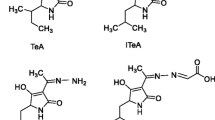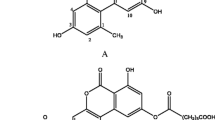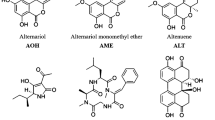Abstract
In this study, a specific monoclonal antibody (mAb) against Alternaria mycotoxin tenuazonic acid (TeA) was prepared and a sensitive indirect competitive enzyme-linked immunosorbent assay (ic-ELISA) for the detection of TeA was developed. Tenuazonic acid coupled with carboxymethoxylamine hemihydrochloride (TeA-CMO) was conjugated to keyhole limpet hemocyanin (KLH) as an immunogen for Balb/c mice injection. The hybridoma cell line 3F10 secreting the mAb specific to TeA was obtained, and then by intraperitoneal injection and the caprylic acid-ammonium sulfate precipitation, the purified mAb was prepared and identified as the immunoglobulin G1 isotypes. The affinity constant (kD) of the mAb was 3.045 E−3 M by SPR analysis. Based on this mAb, an ic-ELISA was established after optimization of assay condition, namely the concentration of coating antigen and antibody were 250 ng/mL and 125 ng/mL respectively, competition time of antigen-antibody was 40 min, and incubation time of secondary antibody was 40 min in 0.01 M PBS buffer (pH 7.4). Under the optimized condition, the IC50 value and the detection limit (LOD) were 18.50 ng/mL and 1.00 ng/mL respectively. The average recovery rate from spiked beer, apple juice, and grape juice was from 85.0 to 120.0%. A squared coefficient of correlation (R2) between ic-ELISA and HPLC method was 0.9732. The established ic-ELISA provides an acceptable technique for the detection of TeA residue in food samples.





Similar content being viewed by others
References
Abad A, Montoya A (1997) Development of an enzyme-linked immunosorbent assay to carbaryl. 2. assay optimization and application to the analysis of water samples. J Agric Food Chem 45:1495–1501. https://doi.org/10.1021/jf950691w
Abad A, Moreno MJ, Montoya A (1999) Development of monoclonal antibody-based immunoassays to the n-methylcarbamate pesticide carbofuran. J Agric Food Chem 47:2475–2485. https://doi.org/10.1021/jf981184s
Bhat R, Sridhar KR, Karim AA (2010) Microbial quality evaluation and effective decontamination of nutraceutically valued lotus seeds by electron beams and gamma irradiation. Radiat Phys Chem 79:976–981. https://doi.org/10.1016/j.radphyschem.2010.04.002
Bruce VR, Stack ME, Mislivec PB (1984) Incidence of toxic Alternaria species in small grains from the USA. J Food Sci 49:1626–1627. https://doi.org/10.1111/j.1365-2621.1984.tb12864.x
Chen LY, Wang MC, Xiang HF, Lin XJ, Cao DH, Ye LY (2014) Prediction of effect-site concentration of sufentanil by dose-response target controlled infusion of sufentanil and propofol for analgesic and sedation maintenance in burn dressing changes. Burns 40:455–459. https://doi.org/10.1016/j.burns.2013.08.002
Fan C, Cao XL, Liu M, Wang W (2016) Determination of Alternaria mycotoxins in wine and juice using ionic liquid modified countercurrent chromatography as a pretreatment method followed by high-performance liquid chromatography. J Chromatogr A 1436:133–140. https://doi.org/10.1016/j.chroma.2016.01.069
Fernández-Cruz ML, Mansilla ML, Tadeo JL (2010) Mycotoxins in fruits and their processed products: analysis, occurrence and health implications. J Adv Res 1:113–122. https://doi.org/10.1016/j.jare.2010.03.002
Fontana AR, Prendes LP, Morata VI, Bottini R (2016) High-throughput modified QuEChERS method for the determination of the mycotoxin tenuazonic acid in wine grapes. RSC Adv 6:95670–95679. https://doi.org/10.1039/C6RA22990E
Fraeyman S, Devreese M, Broekaert N, Mil TD, Antonissen G, Baere SD, Backer PD, Rychlik M, Croubels S (2015) Quantitative determination of tenuazonic acid in pig and broiler chicken plasma by LC-MS/MS and its comparative toxicokinetics. J Agric Food Chem 63:8560–8567. https://doi.org/10.1021/acs.jafc.5b02828
Gross M, Curtui V, Ackermann Y, Latif H, Usleber E (2011) Enzyme immunoassay for tenuazonic acid in apple and tomato products. J Agric Food Chem 59:12317–12322. https://doi.org/10.1021/jf203540y
Janardhanan KK, Husain A (1984) Phytotoxic activity of tenuazonic acid isolated from Alternaria alternata (Fr.) Keissler causing leaf blight of Datura innoxia Mill. and its effect on host metabolism. J Phytopathol 111:305–311. https://doi.org/10.1111/j.1439-0434.1984.tb00774.x
Li FQ, Yoshizawa T (2000) Alternaria mycotoxins in weathered wheat from China. J Agric Food Chem 48:2920–2924. https://doi.org/10.1021/jf0000171
Liang CZ, Jin RY, Gui WJ, Zhu GN (2007) Enzyme-linked immunosorbent assay based on a monoclonal antibody for the detection of the insecticide triazophos: assay optimization and application to environmental samples. Environ Sci Technol 41:6783–6788. https://doi.org/10.1021/es070828m
Lin L, Wu XL, Luo PJ, Song SS, Zheng QK, Kuang H (2019) Ic-ELISA and immunochromatographic strip assay based monoclonal antibody for the rapid detection of bisphenol S. Food Agric Immunol 30:633–646. https://doi.org/10.1080/09540105.2019.1612330
Liu JW, Lu CC, Liu BH, Yu FY (2016) Development of novel monoclonal antibodies-based ultrasensitive enzyme-linked immunosorbent assay and rapid immunochromatographic strip for aflatoxin B1 detection. Food Control 59:700–707. https://doi.org/10.1016/j.foodcont.2015.06.038
Lohrey L, Marschik S, Cramer B, Humpf HU (2013) Large-scale synthesis of isotopically labeled 13C2-tenuazonic acid and development of a rapid HPLC-MS/MS method for the analysis of tenuazonic acid in tomato and pepper products. J Agric Food Chem 61:114–120. https://doi.org/10.1021/jf305138k
López P, Venema D, Td R, Ad K, Scholten JM, Mol HGJ, Md N (2016) Occurrence of Alternaria toxins in food products in the Netherlands. Food Control 60:196–204. https://doi.org/10.1016/j.foodcont.2015.07.032
Mikula H, Horkel E, Hans P, Hametner C, Fröhlich J (2013) Structure and tautomerism of tenuazonic acid – a synergetic computational and spectroscopic approach. J Hazard Mater 250-251:308–317. https://doi.org/10.1016/j.jhazmat.2013.02.006
Myresiotis CK, Testempasis S, Vryzas Z, Karaoglanidis GS, Papadopoulou-Mourkidou E (2015) Determination of mycotoxins in pomegranate fruits and juices using a QuEChERS-based method. Food Chem 182:81–88. https://doi.org/10.1016/j.foodchem.2015.02.141
Ni TT, Peng DP, Wang YX, Pan YH, Xie SY, Chen DM, Wang YL, Ta YF, Yuan ZH (2019) Development of a broad-spectrum monoclonal antibody-based indirect competitive enzyme-linked immunosorbent assay for the multi-residue detection of avermectins in edible animal tissues and milk. Food Chem 286:234–240. https://doi.org/10.1016/j.foodchem.2019.02.011
Ostry V (2008) Alternaria mycotoxins: An overview of chemical characterization, producers, toxicity, analysis and occurrence in foodstuffs. World Mycotoxin J 1:175–188. https://doi.org/10.3920/WMJ2008.x013
Rasmussen RR, Storm IMLD, Rasmussen PH, Smedsgaard J, Nielsen KF (2010) Multi-mycotoxin analysis of maize silage by LC-MS/MS. Anal Bioanal Chem 397:765–776. https://doi.org/10.1007/s00216-010-3545-7
Rychlik M, Lepper H, Weidner C, Asam S (2016) Risk evaluation of the Alternaria mycotoxin tenuazonic acid in foods for adults and infants and subsequent risk management. Food Control 68:181–185. https://doi.org/10.1016/j.foodcont.2016.03.035
Sheng YJ, Jiang WX, Saeger SD, Shen JZ, Zhang SX, Wang ZH (2012) Development of a sensitive enzyme-linked immunosorbent assay for the detection of fumonisin B1 in maize. Toxicon 60:1245–1250. https://doi.org/10.1016/j.toxicon.2012.08.011
Siegel D, Merkel S, Koch M, Nehls I (2010) Quantification of the Alternaria mycotoxin tenuazonic acid in beer. Food Chem 120:902–906. https://doi.org/10.1016/j.foodchem.2009.10.070
Stack ME, Mislivec PB, Roach JAG, Pohland AE (1985) Liquid chromatographic determination of tenuazonic acid and alternariol methyl ether in tomatoes and tomato products. J Assoc Off Anal Chem 68:640–642. https://doi.org/10.1007/BF02166275
Walravens J, Mikula H, Rychlik M, Asam S, Devos T, Ediage EN, Mavungu JDD, Jacxsens L, Landschoot AV, Vanhaecke L, Saeger SD (2016) Validated UPLC-MS/MS methods to quantitate free and conjugated Alternaria toxins in commercially available tomato products, fruit and vegetable juices in Belgium. J Agric Food Chem 64:5101–5109. https://doi.org/10.1021/acs.jafc.6b01029
Wang F, Cai J, Eremin SA, Xiao ZL, Shen YD, Tian YX, Xu ZL, Yang JY, Lei HT, Sun YM, Wang H (2018) Fluorescence polarization immunoassay for Alternaria mycotoxin tenuazonic acid detection and molecular modeling studies of antibody recognition. Food Anal Methods 11:2455–2462. https://doi.org/10.1007/s12161-018-1236-8
Xiao ZL, Wang YL, Shen YD, Xu ZL, Dong JX, Wang H, Situ C, Wang F, Yang JY, Lei HT, Sun YM (2018) Specific monoclonal antibody-based enzyme immunoassay for sensitive and reliable detection of Alternaria mycotoxin iso-tenuazonic acid in food products. Food Anal Methods 11:635–645. https://doi.org/10.1007/s12161-017-1033-9
Xu WJ, Han XM, Li FQ, Zhang LS (2016) Natural occurrence of Alternaria toxins in the 2015 wheat from Anhui province, China. Toxins (Basel) 8:308. https://doi.org/10.3390/toxins8110308
Yang XX, Liu XX, Wang H, Xu ZL, Shen YD, Sun YM (2012) Development of an enzyme-linked immunosorbent assay method for detection of tenuazonic acid. Chin J Anal Chem 40:1347–1352. https://doi.org/10.3724/SP.J.1096.2012.11253
Yang JY, Li J, Jiang YM, Duan XW, Qu HX, Yang B, Chen F, Sivakumar D (2013) Natural occurrence, analysis, and prevention of mycotoxins in fruits and their processed products. Crit Rev Food Sci Nutr 54:64–83. https://doi.org/10.1080/10408398.2011.569860
Zhang YQ, Xu ZL, Wang F, Cai J, Dong JX, Zhang JR, Si R, Wang CL, Wang Y, Shen YD, Sun YM, Wang H (2018) Isolation of bactrian camel single domain antibody for parathion and development of one-step dc-FEIA method using VHH-alkaline phosphatase fusion protein. Anal Chem 90:12886–12892. https://doi.org/10.1021/acs.analchem.8b03509
Zhao MP, Li YZ, Guo ZQ, Zhang XX, Chang WB (2002) A new competitive enzyme-linked immunosorbent assay (ELISA) for determination of estrogenic bisphenols. Talanta 57: 1205-1210. https://doi.org/10.1016/s0039-9140(02)00207-2
Zhao K, Shao B, Yang DJ, Li FQ (2015a) Natural occurrence of four Alternaria mycotoxins in tomato- and citrus-based foods in China. J Agric Food Chem 63:343–348. https://doi.org/10.1021/jf5052738
Zhao K, Shao B, Yang D, Li FQ, Zhu JH (2015b) Natural occurrence of Alternaria toxins in wheat-based products and their dietary exposure in China. PLoS One 10:e0132019. https://doi.org/10.1371/journal.pone.0132019
Zhou B, Wang H, Meng B, Wei R, Wang L, An CF, Chen SG, LongYang C, Qiang S (2019) An evaluation of tenuazonic acid, a potential biobased herbicide in cotton. Pest Managemant Science 75:2482–2489. https://doi.org/10.1002/ps.5402
Funding
This research was funded by the Key Area R&D Program of Guangdong Province (No. 2019B020211002), the National Natural Science Foundation of China (No. 31972157), the Science and Technology Planning Project of Guangzhou City (201804020077), and the International Cooperation Program of SCAU (2019SCAUGH03) and Project Supported by Guangdong Province Universities and Colleges Pearl River Scholar Funded Scheme (2017).
Author information
Authors and Affiliations
Corresponding author
Ethics declarations
Conflict of Interest
Yi-Fan Liang declares that he has no conflict of interest. Xiao-Wen Zhou declares that he has no conflict of interest. Feng Wang declares that he has no conflict of interest. Yu-Dong Shen declares that he has no conflict of interest. Zhi-Li Xiao declares that she has no conflict of interest. Shi-Wei Zhang declares that he has no conflict of interest. Yong-Jun Li declares that he has no conflict of interest. Hong Wang declares that she has no conflict of interest.
Ethical Approval
Female Balb/c mice were housed and maintained at the Guangdong Medical Laboratory Animal Center. All animal experiments were performed in compliance with the protective and administrative laws for laboratory animals of China and conducted with the approval of the Institutional Authority for Laboratory Animal Care, South China Agricultural University, Guangzhou, China.
Informed Consent
Informed consent was obtained from all individual participants included in the study.
Additional information
Publisher’s Note
Springer Nature remains neutral with regard to jurisdictional claims in published maps and institutional affiliations.
Rights and permissions
About this article
Cite this article
Liang, YF., Zhou, XW., Wang, F. et al. Development of a Monoclonal Antibody-Based ELISA for the Detection of Alternaria Mycotoxin Tenuazonic Acid in Food Samples. Food Anal. Methods 13, 1594–1602 (2020). https://doi.org/10.1007/s12161-020-01780-w
Received:
Accepted:
Published:
Issue Date:
DOI: https://doi.org/10.1007/s12161-020-01780-w




